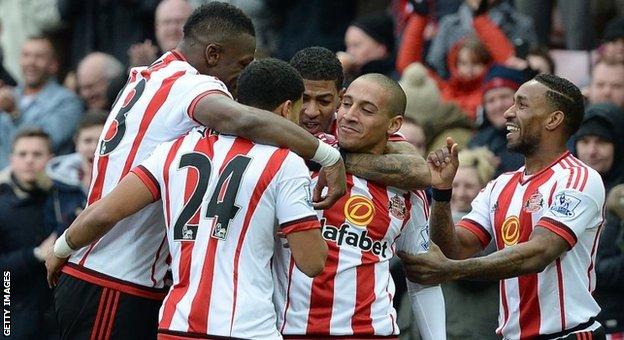 |
Newcastle's defeat at Stamford Bridge was the third time they have conceded five goals or more on their travels, after losing 6-1 at Manchester City and 5-1 at Crystal Palace |
Newcastle dropped into the relegation zone on goal difference after three goals in the first 17 minutes set Chelsea on their way to an easy win.
Diego Costa slid in the opener, a Rolando Aarons error let in Pedro to run clear and fire home, and Costa set up Willian to make it 3-0.
Pedro and Bertrand Traore added further goals in the second half, before Andros Townsend's late consolation.
The only thing to spoil Chelsea's night was an injury to captain John Terry.
The centre-half limped off with a hamstring injury before half-time and is a doubt for Tuesday's trip to play Paris St-Germain in the first leg of their last-16 Champions League tie.
Chelsea's interim manager Guus Hiddink remains unbeaten in 12 games in all competitions, and his side are now unbeaten in their past 10 Premier League games.
Newcastle have only scored seven goals on their travels this season, the worst record in the top four divisions in England, but it was their defence that let them down at Stamford Bridge.
Magpies boss Steve McClaren said in his pre-match TV interview that the first 20 minutes would be crucial to the outcome of the match. He was right, but not in the way he would have wanted.
By then, his side had suffered a complete collapse at the back which was summed up by Chelsea's second goal.
That came from a Newcastle free-kick near the home side's corner flag that was cleared to the halfway line before Aarons' horrendous cross-field pass allowed Pedro to gallop clear.
McClaren's side never looked capable of a second-half comeback as they slipped to a fifth successive away defeat.
After the break, Cesc Fabregas set up Pedro for his second and Bertrand Traore turned in Cesar Azpilicueta's cross.
Andros Townsend's trademark run and finish for his first goal since his £12m move from Tottenham reduced the damage at the end.
But Newcastle's goal-difference still took a battering and at -22 it is now the worst in the top flight.
Chelsea's own defensive problems were of a very different sort.
With Kurt Zouma out for the season, the last thing Hiddink needed before a busy fortnight was to see Terry limp off.
Terry appeared to fall awkwardly after a clash with Magpies striker Aleksandar Mitrovic and will have a scan to assess the severity of his hamstring injury.
Gary Cahill only returned to the starting line-up on Saturday because of Zouma's serious knee injury, but could end up being a key figure at the back for his side in the next few weeks.
He was playing with a broken nose, but Chelsea's man in the mask did not miss his mark.
Along with the impressive Willian, Costa scored one goal and made another but he edged the individual accolade because of his delightful finish to give his side an early lead.
Newcastle boss Steve McClaren: "We got exposed on quite a few occasions in terms of defensive frailties. Rolando Aarons had to play at left-back and it was Steven Taylor's second game in six months.
"We caused our own problems. We knew Chelsea would come out quick. They wanted to win that game by half-time with the week they have ahead of them.
"You get one or two of these games a season. I've told the players don't let that derail us. It was damage limitation by half-time.
"I just wanted to make sure we scored a goal and stayed in the game."
Newcastle are out of the FA Cup and their Premier League game with Manchester City on 28 February has been postponed because City are in the Capital One Cup final.
So the Magpies do not have a game for 18 days until they travel to Stoke on 2 March, and are heading for a training camp in Spain.
In that time, Chelsea play four matches, starting with Tuesday's trip to Paris.
With BBC Sport






